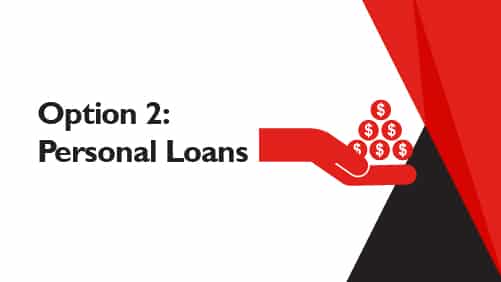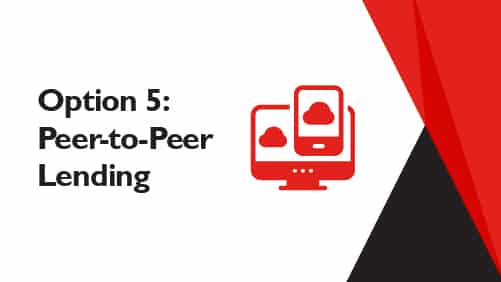Are you ready to turn your business dream into reality, but a lack of funds is getting in the way?
We’re here to uncover five loans for a new business to help get your venture off the ground.
We’ll discuss the pros and cons of each so you can make a financially savvy decision.

1. Unsecured Loans
Unlike traditional secured loans, unsecured loans don’t require collateral, such as property or assets.
So, if your new business doesn’t have significant assets or equity to leverage, this loan may be the way to go.
To qualify for an unsecured loan, you typically need a strong credit history and a solid business plan to demonstrate your ability to repay the loan.
You can use these loans to cover startup business costs and manage cash flow during those crucial early stages.
Pros and Cons of Unsecured Loans
Pros:
- No collateral. Perfect for startups without major assets.
- Quick approval. Faster to get approved than secured loans, as there’s no need to evaluate collateral.
- Flexibility. Useful for funding various business costs.
Cons:
- Higher interest rates. Rates are higher to offset the lender’s risk.
- Limited amount. You might not be able to borrow as much as with a secured loan.
- Stricter eligibility criteria. Lenders can require a solid credit history or a robust business plan.

2. Personal Loans
Personal loans are based on your financial history, not your business’s.
You need a good personal credit score and a stable income to qualify.
These loans are ideal if your business is too new to have its own financial history or if you prefer not to mix business assets and liabilities.
Thanks to the simpler qualification requirements, personal loans are suitable for small business owners and sole proprietors needing money for initial startup costs, inventory, or other early-stage business expenses.
Pros and Cons of Personal Loans
Pros:
- Accessibility. Easier to obtain for new entrepreneurs with good personal credit history.
- Versatility. Money borrowed can be used for any business expense.
- No collateral. Often unsecured, not requiring business assets as collateral.
- Fixed interest rates. Predictable repayment schedule.
Cons:
- Limited amount. Smaller loan amounts than business loans.
- Personal liability. You’re responsible for the debt, which can affect your personal credit and assets if you default on repayments.
- Interest rates. Rates can be higher because these loans are unsecured, and the lender takes on more risk without business collateral. The exact rate depends on your creditworthiness and financial history.

3. Instant Cash Loans
Instant cash loans are a quick funding solution for your new business, with approval usually given within hours or days.
Qualifying depends on your personal credit score and possible proof of income.
Consider an instant cash loan if you’re an entrepreneur needing immediate funds for urgent business expenses or opportunities, like sudden inventory needs or short-term cash flow gaps.
Pros and Cons of Instant Cash Loans
Pros:
- Speed. Fast approval and funding process.
- Convenience. Easy online application process.
- Emergency funding. Great for urgent or unexpected business expenses.
- No collateral. This is an unsecured loan option.
Cons:
- Higher interest rates. Due to the convenience and speed of the loan process.
- Shorter repayment terms. Quicker repayment is often required, which can be challenging for a new business and strain its cash flow.
- Limited amounts. Generally smaller loan amounts than traditional business loans.
- Potential for debt cycle. Risk of dependency on quick loans for ongoing expenses.

4. Investors
Obtaining funding from individual or entity investors isn’t a loan; investors put money into your business in return for a share of ownership and, often, a say in business decisions.
Popular investor options include
- Angel investors: Wealthy individuals who provide capital for startups in exchange for convertible debt or ownership equity.
- Venture capitalists: Professional groups or firms that invest in high-growth potential and later-stage businesses in exchange for equity.
- Private equity firms: Firms that invest in companies through various strategies, including buying and restructuring existing businesses.
- Crowdfunding platforms: Online platforms where businesses can raise small amounts of money from many people in exchange for early access to products or other rewards.
To attract investors, you need a compelling business plan, clear market potential, and, sometimes, a track record of success.
This option is excellent for startup businesses with high growth potential that require significant capital and business expertise beyond the scope of traditional loans.
Pros and Cons of Investors
Pros:
- Larger funding potential. Significant capital, often more than a loan.
- No repayment schedule. There’s no obligation to repay the invested amount.
- Additional resources. Investors can bring expertise and networks beneficial for business growth to the table.
Cons:
- Equity loss. You’ll give up a portion of business ownership.
- Control and decision-making. Potential for interference from investors over how the business is run.
- Pressure to perform. Investors seek a return on their investment, which can add pressure for your business to succeed.

5. Peer-to-Peer Lending
Peer-to-peer (P2P) lending involves individuals lending money to businesses through online platforms, such as
- SocietyOne
- MoneyPlace
- Harmoney
- OurMoneyMarket
- Plenti
To obtain P2P lending, you need a solid credit history and a compelling business plan.
If your new business does not qualify for traditional bank loans or you’re looking for more flexible loan terms and lender expectations, P2P lending could be the right choice.
You can use a P2P loan to cover initial small business costs, expansion, and cash flow management.
Pros and Cons of Peer-to-Peer Lending
Pros:
- Accessible financing. Access to a wider pool of lenders, not limited to traditional financial institutions.
- Flexible loan terms. A range of amounts and repayment terms are available.
- Competitive interest rates. More favourable than bank interest rates, these are based on your creditworthiness and the market.
- Streamlined process. Efficient and user-friendly online application.
Cons:
- Credit reliance. Your credit score significantly impacts your ability to secure a loan.
- Variable interest rates. Rates can vary widely based on the platform and lenders.
- Varied terms and conditions. You’ll need to navigate different lender loan terms.
- Potentially higher fees. Service or transaction fees may apply.
- Additional risks. As a relatively new industry, P2P lending is less regulated than traditional banks.

The Importance of Having a Solid Business Plan
When applying for loans for a new business, a strong business plan can make the difference between getting that much-needed loan or not.
Such a plan assures lenders that you’ve done your homework and are committed to making your business succeed.
A well-thought-out plan should demonstrate that you understand your market, have clear goals, and know how to achieve them.
Clearly showing your business’s potential for growth and profit gives lenders and investors confidence in your ability to repay the loan.
Essentially, your business plan should explain what your business does, who your customers are, how you plan to make money, and your financial projections (like income and expenses).
It should also identify and prepare for potential obstacles by outlining strategies for risk management.

Unlock Financial Potential With the Right Loans for a New Business
Ready to kickstart your business? The team here at Pherrus can help pave the way!
With our expertise in finance and accounting, we’ll guide you through the loan application process.
From understanding types of loans to business planning, Pherrus is your partner in navigating the financial landscape of your new venture.
Don’t wait to turn your business dreams into reality. Reach out to us today!
Fill out this online form or call +61 (02) 9099 9109 to book an appointment at our Bella Vista office in Sydney, NSW.





